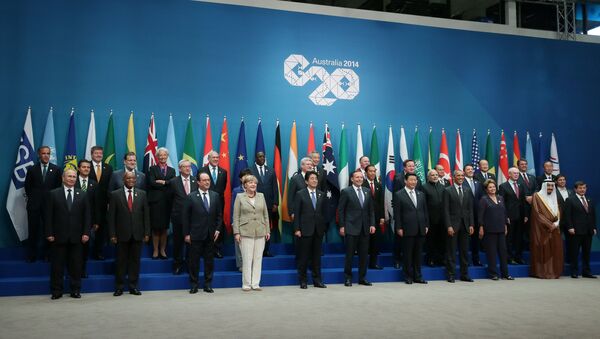PHILADELPHIA, November 16 (Sputnik) — The recently concluded G20 summit is Brisbane is a handy illustration of the increasingly dysfunctional nature of today's global institutions and of the extreme difficulty of making common policy. The treatment that Russia received at the conference is particularly instructive in this regard. Several Western news outlets, like CNN, suggested that “world leaders” were uniformly critical of Putin. The “international community” had supposedly made its voice heard, and the message was a clear one: Russia was isolated.
The simple reality though is that criticism of Russia’s position was largely contained to America’s close allies. Politicians from Canada, the US, Australia, Japan, and the UK aired scathing denunciations of Russian policy, Austrlia’s prime minister even going to far as to say that he would “shirt-front” (which is somehow an expression that means “physically challenge”) Putin when he arrived. But while this made for exciting headlines, it was absolutely not the consensus position of the entire G20. In the lead up to the conference Australia had even tried its best to get Russia dis-invited, but it was unable to do so because China, India, Brazil, and other developing countries steadfastly refused.
No one wants to spoil the “one world” atmosphere that always prevails at these sorts of high-level gatherings, but the reality is that the G20 is split between a group that largely supports American foreign policy objectives and another bloc that (for various reasons) does not.
To be sure, US allies still predominate. A quick glance at the list of members shows that all but a few are reliable supporters of American policy. However Argentina, India, China, Brazil, Indonesia, South Africa and, increasingly, Turkey, all follow independent foreign policies that do not neatly match up with Washington's goals.
While these countries aren't as numerous as the US' supporters, they are larger (India and China are by an extremely wide margin the world's two most populous countries) and, even more importantly, far more economically dynamic. In the future, economic growth will increasingly come from these countries, which means that their voices ought to be ever more important in such gatherings.
And yet the West has, for quite understandable reasons, been reluctant to cede its leading role. It’s easy to talk about being “more inclusive” in abstract terms, but when it comes time to create actual policy agendas Western leaders don’t want to yield ground to their counterparts from the developing world. The result is either gridlock (as in the never-ending Doha round of trade negotiations) or policy that is so vague that it is practically useless (much of what was just agreed to in Brisbane). It’s difficult to see how this basic political problem will ever be solved.
By far the most important “deal” that was struck over the past few weeks, US-China agreement on climate change, was bilateral. There are reasons to be skeptical of the climate deal’s staying power, the fact that it was imposed via executive order means that it can be summarily undone by the next US president, but unlike the mush that came out of the G20 summit it involves very specific commitments from both sides (these commitments were why the negotiation process was so long and difficult).
The US-China climate agreement seems more likely than not to represent the future of international diplomacy. In an environment in which the major international institutions are either obsolete and out of date (the G7) or so divided as to be practically useless (the G20) real progress will come in small increments through intensive back-channel negotiations. This will be unsatisfying, there will be relatively few victorious press conferences and photo-ops, but intensive cooperation between two countries has a stronger institutional, legal, and political basis.
It would be much nicer, of course, if the G20 were able to pass sweeping reforms that would simultaneously increase growth, lower unemployment, and reduce volatility in the currency markets. If all of the world’s largest economies could meaningfully cooperate, there’s no doubt that everyone would be a lot better off. Unfortunately, though, there’s no way to “get there from here,” no practical way in which the enormous differences in outlook and interest between the G20’s members can be mollified. India’s economic needs are so starkly different from France’s or South Korea’s that it’s just not possible to create a policy that meets everyone’s expectations.
The views expressed in this article are solely those of the author and do not reflect the official position of Sputnik.




